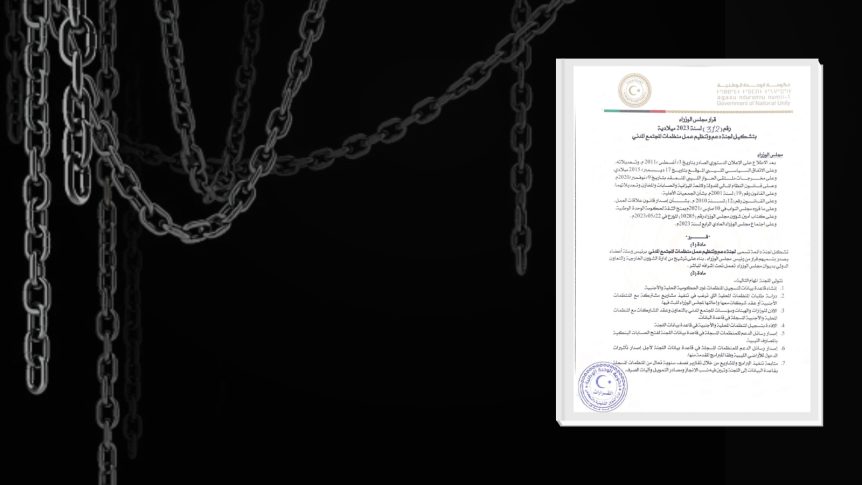A decision issued on 22 May 2023 by the Government of National Unity in Tripoli will create a new commission to oversee civil society organizations (CSOs). Under the purview of the prime minister, the commission will be given full control of local and international organizations in Libya through the application of a repressive Gaddafi-era law. The new commission is likely to unduly restrict the work and formation of CSOs, warns the Cairo Institute for Human Rights Studies (CHIRS).
Appointed by the prime minister’s office and working under its direct supervision, the six-member commission will, according to the 22 May decision, “support and organize” the work of civil society organizations. The commission could, in theory, represent a legitimate attempt to regulate CSOs and support them in their work. But given that the commission is being formed amid an intensifying crackdown on civil society throughout Libya, CIHRS is concerned that it will be used by the authorities as an additional tool to interfere in the formation, registration, and work of CSOs. Both governments in the east and the west are currently targeting local and international organizations; threatening them with suspension and dissolution and arresting their members.
Under the decision, the incoming commission is granted the authority to create a database for the registration of local and international CSOs and to study legalization requests from organizations. The decision neither specifies the process for registration nor the criteria for legalization but instead refers in its introductory paragraph to the repressive Gaddafi-era Law 19, adopted in 2001, as the basis for the commission’s work. The application of Law 19 of 2001 represents an ominous development for civil society; the law prohibits the establishment of CSOs working on human rights, only recognizing organizations that provide social, cultural, sports, charitable, or humanitarian services. Furthermore, the law requires executive approval for CSOs to be established; it gives authorities the right to close, dissolve, or merge organizations; or assign a temporary management committee to run an organization- all without judicial authorization or oversight. Under the 22 May decision, both international and local CSOs must attain prior authorization from the commission to open a bank account, while the commission approves and supervises all activities implemented by CSOs in Libya, evaluating their relevance and funding sources.
The above authorities of the new commission contravene the right to free association established under Article 22 of the International Covenant on Civil and Political Rights (ICCPR), ratified by Libya in 1970[1]. Under the interpretation of that article by United Nations bodies, CSOs should be able to register with the competent administrative body through a declarative non-authorization process; CSOs should also be able to conduct their activities without prior authorization, such as meeting with local and international communities or opening a bank account. Moreover, judicial oversight or due process is required under Article 22 for the authorities to suspend or dissolve an organization, refuse its registration, or freeze its assets.
Libya already has a Civil Society Commission, based in Tripoli and established in 2018, similarly tasked with registering and approving CSOs and their activities. It is unclear whether this new commission will replace it or not. Although the current commission also has broad regulatory powers over CSOs, CIHRS is concerned that the new commission, because it derives its authority from Law 19 of 2001, will be further enabled to repress civil society and arbitrarily ensnare staff and activists in administrative proceedings. In view of recent attacks on civil society, including the arrest of activists and threats to dissolve organizations that are not registered under Law 19, it is likely that the new commission will be used to further facilitate the repression of civil society.
CIHRS urges Libya’s Government of National Unity to immediately suspend the application of Law 19 and any other repressive legislation that applies sweeping restrictions on civil society organizations; to refrain from adopting any new mechanism, institution or regulation based on Gaddafi-era laws; and to support the adoption of a new law on CSOs that is fully consistent with international standards.
Background
There has been a recent series of measures affirming the illegality of organizations not registered under the draconian Gaddafi-era Law 19; by classifying these CSOs as unlawful, their staff is put at risk of criminal prosecution – up to the death penalty- under Article 206 of the Penal Code. On 8 March 2023, the Law Department of the Supreme Judicial Council issued a fatwa (opinion) declaring illegal all civil society organizations not registered under Law No. 19 of 2001. On 13 March, the Foreign Affairs Department of the Prime Minister’s Office issued a memorandum also asserting the illegality of CSOs unregistered under Law 19, annulled and invalidated by the 2011 Constitutional Declaration. On 21 March, the Government of National Unity issued Decree No. 7 of 2023, allowing local and foreign organizations to continue functioning temporarily until they are registered again under the authoritarian stipulations of Law 19.
Throughout Libya, the assault on civil society has continued to intensify leading up to the 22 May decision to establish a new civil society commission. On 6 May, the General Intelligence Service (GIS) in the eastern region published a warning to local CSOs and all public institutions receiving funding or in-kind support from foreign entities that if they do not disclose their finances, activities, and the movements of any foreign employees, then they would be subject to prosecution and security measures. On 12 and 13 May, the Internal Security Agency arrested an employee of the Italian organization ‘Ara Pacis’ and its legal representative in southern Libya, accusing them of cooperating with a foreign organization to settle immigrants in southern Libya.
[1] Report of the Special Rapporteur on the rights to freedom of peaceful assembly and of association, Maina Kiai, specific recommendations, parag.95 to 100, page 21.
Share this Post

